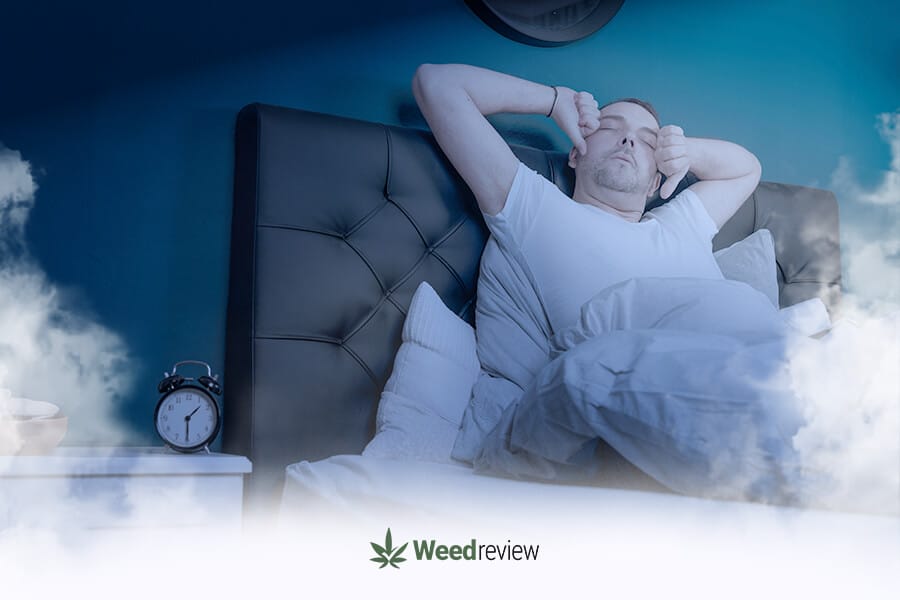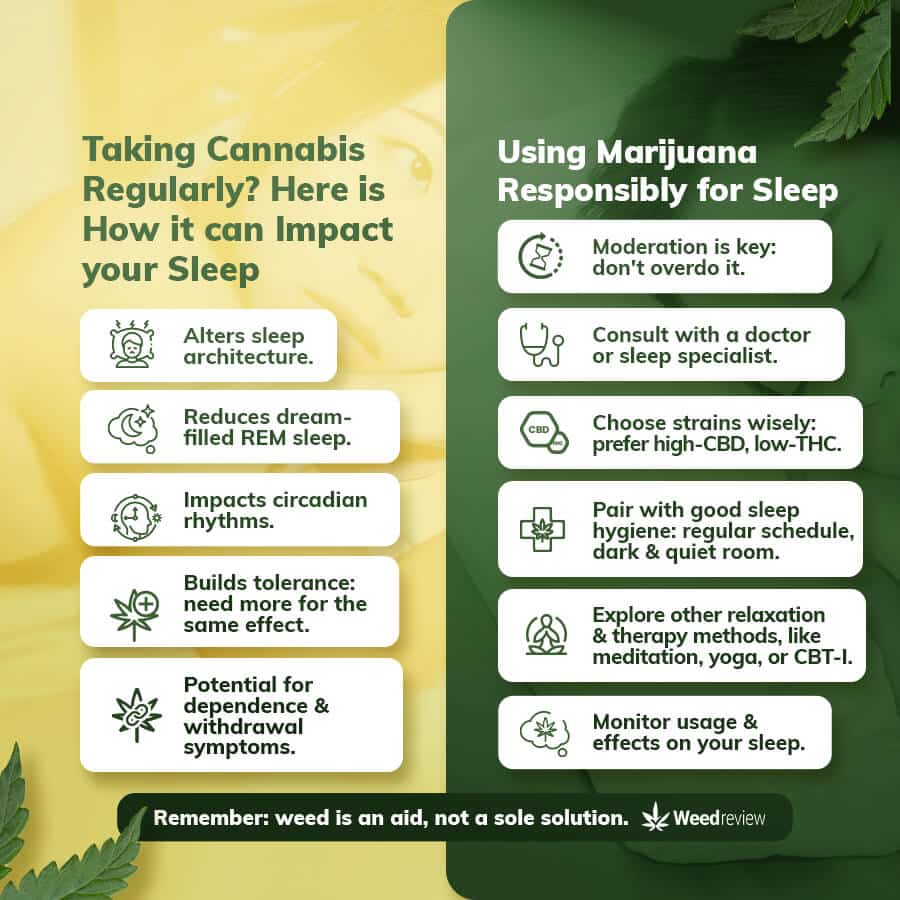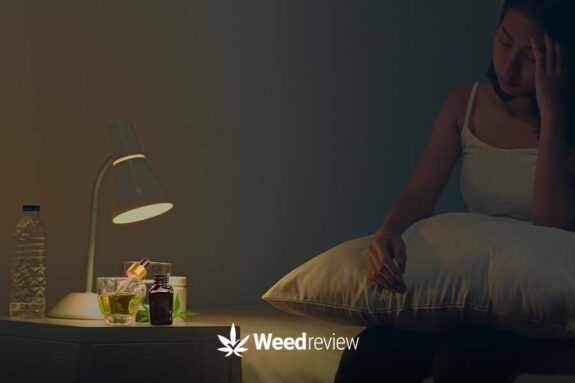
Sleep Problems & Marijuana: How Frequent Cannabis Use Can Contribute to Sleep Disturbances

Table of Contents
Sleep is a crucial part of our health. But sometimes, getting a good night’s sleep is not that simple. Many people turn to cannabis for help. Weed can indeed help you with sleep at first. It helps you fall asleep faster and improve your sleep quality.
But in the long run, it may not be the best friend to tackle problems like insomnia. Chronic cannabis use – without a doctor’s guidance – can get in the way of your slumber.
This article will explore what can happen when you take medicinal marijuana regularly to combat sleep disorders and what you can do to prevent them.
What problems can marijuana cause for our sleep?
From developing a tolerance to disrupting your REM sleep, weed can significantly impact the way you sleep. These issues range from needing more cannabis to get the same effect to having less dream sleep and even changes to your sleep cycle.
Let’s delve into these problems.

Changes in Sleep Architecture
Sleep is not just about being awake or asleep—it involves a cycle of several stages, including light sleep, deep sleep, and dream sleep. This cycle is known as sleep architecture.
This architecture mainly has two types of sleep: non-rapid eye movement (NREM) sleep and rapid eye movement (REM) sleep. The NREM sleep is further divided into three stages:
- Stage 1: This is a light sleep stage where we drift in and out of sleep, can be easily awakened, and may not feel like we’ve slept at all.
- Stage 2: Here, we become less aware of our surroundings as our body temperature drops and heart rate slows. This is still considered light sleep, but we’re getting closer to deep sleep.
- Stage 3: This is the deep sleep stage. It’s the most restorative stage, where the body repairs muscles and tissues, stimulates growth and development, boosts immune function, and builds up energy for the next day.
After the deep sleep stage, we move into REM sleep, which is when most dreaming occurs.
When we introduce cannabis, things can get complicated. Chronic cannabis use can disrupt this well-designed architecture, leading to less time in the deep, restful stages of sleep and more time in the lighter stages. In other words, you do not get a restorative sleep.
This is why you wake up not feeling refreshed but groggy and tired if you have taken weed the night before. You may experience daytime fatigue, mood changes, and a slow, lazy day.
Reduced REM sleep & fewer dreams
Most of our dreams occur in the REM sleep stage.
This stage is essential for our brains to rest and process what we learn during the day. REM sleep also plays a crucial role in our brain’s health and function. It helps us understand emotions, store memories, and learn new information.
Using cannabis can reduce this dream sleep. Over time, this could mean having fewer dreams.
Since REM sleep is key to learning and memory, having less of it might make it harder for you to remember new information or learn new skills. Reduced REM sleep also means your brain might need more rest and processing time to function at its best.
A lack of REM sleep can also make you cranky, unproductive, or unfocused.
Impact on circadian rhythms
Circadian rhythms are natural, internal processes that regulate the sleep-wake cycle and repeat roughly every 24 hours.
It is like an internal clock that tells us when to wake up and sleep. It works with sunlight and darkness to keep our sleep-wake cycle regular. When you use cannabis, especially close to bedtime, it can confuse this clock. Research shows that cannabis use can alter circadian rhythms.
Cannabis might make you sleepy even when it’s not your bedtime. If you give in to this sleepiness, you might fall asleep earlier than usual. Then, you might wake up earlier or later than usual. Over time, this can shift your entire sleep-wake cycle out of sync. You might feel tired during the day, unable to sleep at night, or struggling with irregular sleep patterns.
The same was also validated in a study published in the Regional Anesthesia & Pain Medicine journal. In frequent users, cannabis was associated with sleeping less than 6 hours or more than 9 hours a night – both outside the optimal sleep times. This suggests cannabis might interfere with our natural circadian rhythm. The study also found that cannabis users were more likely to struggle with sleep problems, like falling or staying asleep.
Building Tolerance
Think of the first time you had a cup of strong coffee or tea. You probably felt very alert and awake. But that strong effect would slowly disappear if you started having a cup daily. This is called building tolerance, and the same happens with cannabis.
At first, weed might help you sleep. But over time, you might need more and more to get the same effect. This is why long-term frequent weed use is linked with decreased sleep – your body gets used to weed. And the more cannabis you use, the more it can mess with your sleep.
Addiction & withdrawal
When we engage in activities that make us feel good, our brain remembers and wants to repeat them. This is the basis for dependence or addiction. Using cannabis, especially for a long time, can lead to a similar situation.
At first, you might use cannabis to relax or help with sleep. It might seem to work well. However, over time, your brain starts to depend on cannabis to relax or sleep. This is when dependence kicks in. You might feel like you cannot sleep without cannabis, even if you’re tired.
This dependence can become a problem if you want to stop using cannabis. Suddenly quitting cannabis can cause withdrawal symptoms, similar to what a regular coffee drinker might feel without their morning cup.
Without marijuana, you might feel anxious, have trouble sleeping, or feel very tired during the day. These withdrawal symptoms can make it very hard to stop using cannabis, even if you want to. This is where it turns into an addiction.
Addiction isn’t just a matter of willpower. It’s a condition where your brain is so used to cannabis that it needs it to function normally. Trying to quit without support can be difficult and, in some cases, harmful.
How to avoid sleep problems from using too much weed
Consider the following strategies to address the potential long-term problems associated with using cannabis for sleep:
- Practice mindful use: Aim to use cannabis in moderation. Stick to the recommended dosage. Avoid making it your primary sleep aid, and use it only when absolutely necessary. This can help prevent building tolerance and dependency.
- Consult a doctor: Regular check-ins with your doctor or a sleep specialist can help monitor your use of cannabis and its effects on your sleep health. They can provide personalised advice based on your specific needs and circumstances.
- Build good sleep habits: Try to keep a regular sleep schedule and make your bedroom quiet and dark at night. Also, try not to have coffee or energy drinks before you sleep. Exercise every day can help too. These things can help you sleep better and follow good sleep hygiene without needing too much weed.
- Consider cognitive behavioural therapy (CBT): CBT for insomnia (CBT-I) can help you develop healthier sleep habits and address negative attitudes and fears about sleep. This therapy is often the first line of treatment for insomnia.
- Try other ways to relax: Consider other remedies for sleep problems, such as meditation, yoga, mindfulness, and relaxation exercises. These can help improve sleep quality without any potential negative effects.
- Use cannabis strains with care: Different strains of cannabis have different effects on sleep. Strains high in CBD and low in THC are generally better for sleep.
Remember, long-term use of cannabis for sleep should be managed under the guidance of a doctor. Always prioritise maintaining a balanced lifestyle that supports good sleep health.
The benefits of cannabis for sleep
While it’s important to understand the potential risks of cannabis use, it’s also worth noting that responsible use of this medicinal plant offers some benefits to our sleep. Let’s take a look:
- Relief from chronic pain: Cannabis contains cannabinoids that can help reduce pain. This relief can make it easier for people with chronic pain to fall asleep and stay asleep.
- Anxiety reduction: Certain strains of cannabis, mainly those high in cannabidiol (CBD), have been known to reduce feelings of anxiety. Less anxiety can often lead to better sleep.
- PTSD symptoms management: Cannabis has been used to treat Post Traumatic Stress Disorder (PTSD). It may help manage nightmares and other sleep disruptions commonly experienced by individuals with PTSD.
- Better sleep for people with sleep disorders: Some research suggests that cannabis can effectively treat certain sleep disorders, like insomnia. It might help people fall asleep faster and stay asleep longer.
Of course, these effects vary from person to person and depend on factors like dosage and the severity of the problem. The benefits are also more evident when cannabis is taken under the guidance of a doctor.
Conclusion
Cannabis, when used responsibly, can offer benefits, such as helping with sleep problems. However, it’s essential to remember that these advantages should be balanced against potential long-term effects arising from frequent use. These might include needing more cannabis to sleep, feeling restless without it, and changes in your dream sleep and overall sleep structure.
Remember that every person’s reaction to cannabis can be different. For some, especially under medical supervision, cannabis can be a beneficial aid to improve sleep quality and manage sleep-related issues. However, using cannabis as a sleep aid shouldn’t be impulsive. Speak to your doctor to prepare the best course of action.
Medical cannabis can be part of a holistic approach to improving sleep and overall health when used mindfully.


